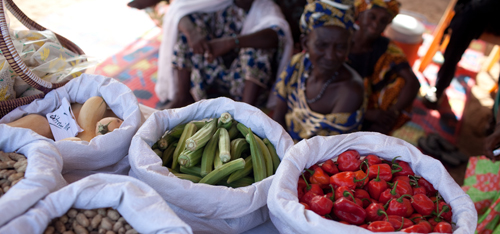Climate change adaptation
Countries in Africa are experiencing steep increases in population numbers, coupled with unprecedented levels of burden on natural resources, changes in nutritional habits and a steady shift towards urbanization. Adding to these pressures, African nations are seeing increasing climate variability, manifested as extreme weather events (floods and droughts) and an increasing overall uncertainty in the seasonal patterns of rainfall.
Climate change threatens significant decreases in agricultural and animal production systems and deterioration of the ecosystems, with direct consequences on food security and income of the most vulnerable populations and on the livelihoods of future generations.
In order to sustainably increase food and nutritional security in the face of these challenges, farming communities will need to develop and implement adaptation strategies that improve the productivity, efficiency, profitability and fairness of agricultural production and marketing systems.
The Integrated Production and Pest Management (IPPM) programme works with communities, farmer organizations, civil society, local and national governments and other actors to support actions to build more resilient agricultural production systems, from the field, to district, national and regional levels.
Development of institutional capacity
At the agricultural sector planning level (district and national levels), the programme engages with stakeholders to incorporate climate change adaptation (CCA) concerns and strategies into ongoing agricultural development initiatives and into agricultural policies and programming, in order to:
- increase institutional capacity at national level to develop CCA policies, strategies and programmes, shifting from a reactive response to a pro-active preparedness approach;
- involve partners and governmental programmes to actively pilot improved soil and crop management practices in different production systems;
- mainstream climate change considerations into agricultural sector policies, programmes and to advocate planning based on “lessons learned”;
- establish mechanisms for cross-sector coordination and awareness-raising on climate-resilient production and food security issues.
Awareness-raising and empowerment of farming communities
At the local level, the IPPM programme uses farmer field schools (FFS) as a platform to build capacity in communities to learn about, explore, adapt and eventually adopt improved agricultural practices. To this end, an FFS approach aims to:
- facilitate community based self-assessment processes that help enable communities to better understand past trends, current status and future possible scenarios for the management of the different sectors of farming systems (e.g., soils, seeds, water, markets, labour, land tenure, etc.), leading to improved prioritization, plans and actions taken by individual farmers and by communities;
- expose farmers to new CCA soil and plant management practices and technologies that provide greater opportunities for improved management, including use of quick maturing crops, adjustment of planting seasons, increased use of legume species and forages in rotations, increased use of quality seeds, better management of perennial native species, and overall increased diversification of the farmscape, among others;
- involve farmer groups in CCA-policy related consultative processes at community, district and national level;
- promote sharing and dissemination of CCA strategies and practices by developing FFS curricula that better integrate adaptation processes and highlight lessons learned;
- build long-term adaptive capacity by training government technical staff, civil society and farmer facilitators in the FFS approach.

